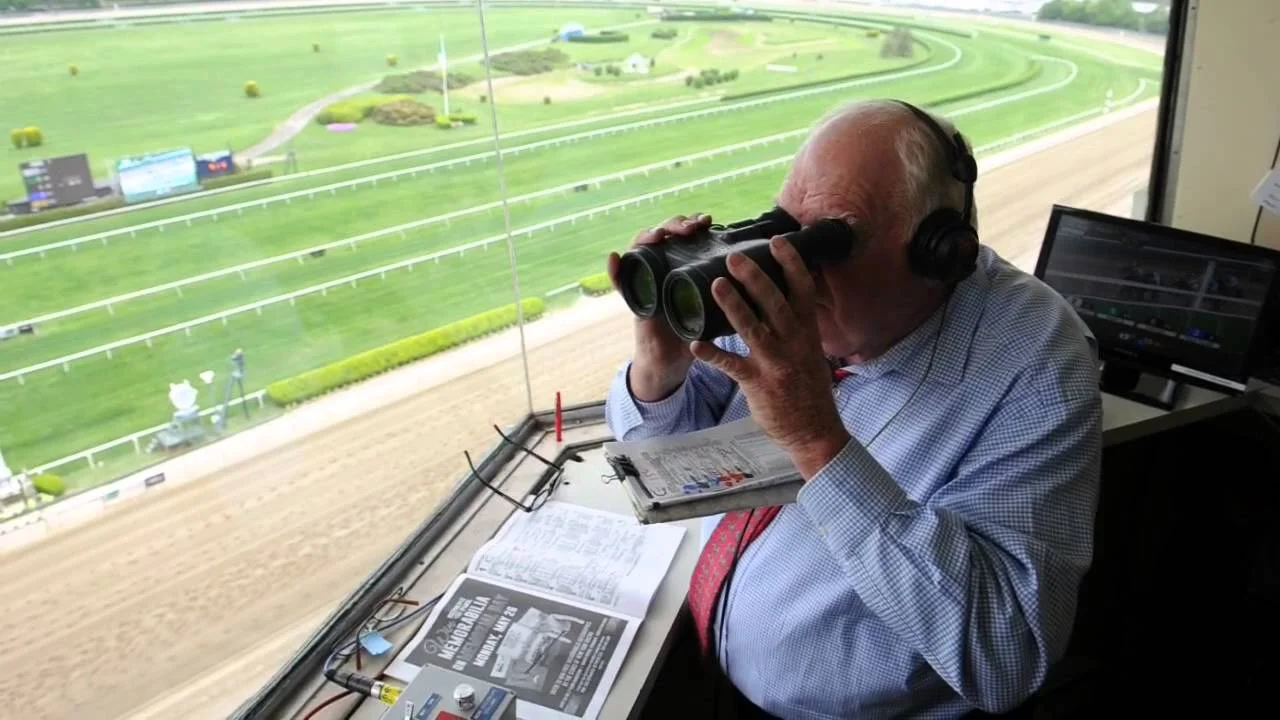The Program: Race Callers
Mike Spector
The ability to capture the greatest moments in horse racing history in words that will be encapsulated for generations to cherish is the everlasting gift that race callers give to the sport.
The best race calls of all time are remembered almost equivalent to the performances of the actual champion race horses. The track announcer is tied to these legendary horses and races for years to come.
The “Stories: The Greatest Race Calls” panel at Equestricon will bring together four of the top race callers, past and present, as Tom Durkin, Larry Collmus, Dave Rodman and Travis Stone will each tell a story about one of their classic race calls. The panelists also will take questions from Equestricon attendees during this 2-hour long “Storytellers” panel to be held on Tuesday, August 15, starting at 1 p.m. at the Saratoga Springs City Center.
“It’s a fantastic panel, I’m honored just to be on that panel, just to be on the same stage as all those race callers,” said Rodman, who has called a total of 26 Preakness Stakes as the main track announcer for the Maryland circuit.
Stone is the youngest race caller on the panel and has put his place on the panel in perspective.
“To sit on a panel with Tom, Larry and Dave, it’s a big honor and sort of a validation of what you’ve always wanted to achieve and it’s a good feeling,” said Stone.
Since each track announcer can only choose one race call to discuss, there is some suspense to what races will be featured at this Equestricon panel. With over 100 years of experience including a total of 91 Triple Crown races, these four track announcers have options that are almost limitless on what great races and horses to choose.
Durkin’s Legacy
Praised by many as the greatest race caller of all time, Tom Durkin narrated the story of many of the great horses of our generation over his illustrious 43-year career.
Durkin's legendary status is bolstered by the race callers that he's influenced over his years including Stone, who has called two Kentucky Derbies to date as the track announcer for historic Churchill Downs.
"I idolized (Durkin) growing up. He was so good at calling races and is without a doubt the reason I wanted to be a race caller," said Stone.
Durkin broke through as the voice of the Breeders' Cup for NBC Sports from its inception in 1984 through 2005. He was the voice of the Triple Crown from 2001 to 2010 and called races on the New York Racing Association (NYRA) circuit from 1990 until his retirement in 2014.
With all those races to choose from, Durkin hasn't even started to think about narrowing it down to one race call for the Equestricon panel.
“I’m always asked that question, ‘What’s was your favorite call?” I really don’t have an answer. My list is probably going to be the same list as most folks,” said Durkin. “Over the years, the Breeders’ Cup races, the Belmonts, I mean I got a pretty long list. I did it for so long, I have a long list to choose from, so I don’t have an answer (to what call I’ll choose).”
If it was up to Collmus, though, the choice for Durkin's call would be easy.
"My favorite of Tom’s race calls is Holy Bull’s Travers. ‘There’s cause for Concern’ was one of the best lines ever," said Collmus. “Holy Bull was everything to me. He actually won the first Haskell I ever called back in 1994 during my first year at Monmouth. I followed him around that year. (Durkin's Travers call) meant a lot to me because I was a huge Holy Bull fan.”
Durkin agreed, “The performance of Holy Bull (in the Travers) was one of the best I’ve ever seen by any horse anywhere.”
Calling the Triple Crown
The mystery of which call Durkin will use will linger for months leading up to Equestricon.
Collmus’ choice is easier, even though he has been calling races since 1985 starting at the age of 18. Collmus has twice succeeded Durkin as the voice of the Triple Crown for NBC Sports in 2011 and as NYRA's main track announcer in 2015. Collmus has many historical calls during this time, but one stands out from the crowd.
“Mine is kind of obvious – it’s American Pharoah’s win in the Belmont Stakes and becoming the first Triple Crown winner in 37 years and me being the lucky guy up there that got to narrate that event in history," said Collmus. "I’ll certainly be using that race as the one I’ll be talking about."
Durkin was quick to commend Collmus when asked about his call of the American Pharoah Triple Crown.
“It was right on the nuts perfect,” joked Durkin. “I wouldn’t have changed a thing. I basically had nine opportunities to call a Triple Crown winner and was for 0 for 9. I was supposed to call that race that year because it was the final year of my contract (with NYRA). They let me out of the last year of my contract, which was American Pharoah’s year. So I take complete responsibility for American Pharoah winning the Triple Crown. I am wholly responsible.”
Since Collmus was both the NBC Sports and NYRA announcer in 2015, his call will live on as the only one capturing American Pharoah's Triple Crown punctuated by his memorable words: "The 37 year wait is over, American Pharoah is finally the one!"
The beginning of the call when Collmus noted that American Pharoah didn't break well from the gate is often overlooked, though, and is also a highlight of the call.
“Normally in a race when they’re all lined up, you’re looking at all the horses as they come out of the gate. For me in a race like that, I’m only looking at one, because he (American Pharoah) was the story," said Collmus. "As soon as the gates opened, that split second, he rocked backwards and in fact (jockey) Victor (Espizona) talked about it later. Immediately I’m thinking to myself, ‘Here we go again.’ Then he just rocketed forward from that and literally within five jumps was in front. He was absolutely amazing. I can’t say enough good things about that horse.”
Preakness Calls
Rodman is a contemporary of Collmus noting that they both were applying for the Maryland track announcer position in 1991. Rodman got the job and 26 years later has compiled a list of classic calls including a catalog of Preakness calls chronicling the history of the race.
Still, Rodman, whose been calling races since 1981, is not sure if he'll even use a Preakness call for the Equestricon panel.
“Initially, when I was told about the concept of the panel, I went over thinking about my Preakness calls that I’ve done. A few years ago, it would’ve been easy to say I was going to do the 1997 (Preakness with) Silver Charm, Free House and Captain Bodgit. That’s it, that’s my favorite call," said Rodman. "Now I realize that I’ve been through 26 of them, a lot of great things have happened and a lot of great history. There’s been some classics like Afleet Alex (in 2005) getting wiped out at the top of the stretch and coming back with Jeremy Rose aboard. And then I thought maybe Rachel (Alexandra in the 2009 Preakness)."
Even with some of the great names listed above, Rodman is thinking "outside the box" for his Equestricon call.
“I really do believe it is going to be a non-Preakness call, but I haven’t fully solidified that. I’m leaning to a call with more (YouTube) hits than any of my Preakness calls, but I may change my mind," said Rodman. "I may have to do a coin flip if it comes down to two of them.”
One thing is for sure, Rodman gets the prime spot to call the Preakness each year while the NBC Sports announcer including Durkin and Collmus are forced to stand on the roof at Pimlico Race Course.
“I’m in my booth and they’re on the roof,” Rodman said. “They’re to the left of me and to the left of the finish line and I’m just to the right of the line, so we both have excellent vantage points. We’re about equidistant from the actual wire at Pimlico.”
Durkin was indeed envious of Rodman’s position during his Preakness calls.
“When I called the Preakness all those years, I was just standing out on the roof and if it rained, somebody would put me under an umbrella and that was about it,” said Durkin. “So I was always very jealous of Dave (Rodman) and his commodious and covered announcer’s booth. Sometimes I would sneak up to the booth and share some air conditioning."
Collmus has withstood the elements on the Pimlico roof, too, including the 2015 Preakness when American Pharoah won the middle jewel of the Triple Crown after a monsoon engulfed the track.
"An umbrella would have been worthless that year. It was crazy. The storm came in from the clubhouse turn. It didn't look like rain, it looked like a tidal wave," said Collmus. "Luckily the year before they built a roof and enclosed my area except for the front. If they hadn't built that, me and the equipment would have been swimming. I think the only one who didn't seem to mind it was American Pharoah."
The Next Generation
Weather wasn't a concern when American Pharoah won the first leg of the Triple Crown and coincided with Stone's first ever call of the Kentucky Derby, as he had recently taken over as the track announcer for Churchill Downs.
"I’d be shocked if I didn’t use the Pharoah Derby call (for the Equestricon panel) just because of the enormity of that and the fact that it was my first Derby call," said Stone.
As noted, Stone had been preparing for this day for a long time looking up to Durkin.
“I remember him as a little kid, 10 or 11 years old,” said Durkin. “There's this little kid who would stand underneath the announcer's booth on the apron at Saratoga, instead of looking at the races, he was looking up at me. Then he wrote me a letter that he wanted to be a track announcer. I had him up and let him stand out on the roof, in time, so he could practice calling races."
Stone corroborated Durkin’s recollections by saying, “He’s absolutely right, I used to watch him call races from the apron at Saratoga. I was even younger than 10 years old when I did that. I was doing that as long as I could remember.”
Stone and Durkin’s relationship has continued for many years including before his first Derby call.
“When I called him (on the phone) before I called my first Derby, he gave me more than an hour of his time with all sorts of advice on how to call the race,” said Stone. “It was like getting a private lesson if you’re a cellist from Yo-Yo Ma or a golfer from Jack Nicklaus.”
Stone also got help from Collmus when he was in college getting the opportunity to call his first two live races at Suffolk Downs in 2003. Stone would soon get his first job at Louisiana Downs in 2005 and has been calling races ever since including filling in for Collmus as the NYRA announcer this winter at Aqueduct.
The stories behind these great race calls of our generation go together well with the stories of how these four race callers have helped each other along their intertwined paths and will indeed be one of the highlights of Equestricon.









